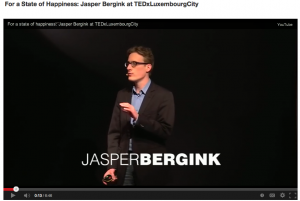 It doesn’t happen every day that I make one of my dreams come true.
It doesn’t happen every day that I make one of my dreams come true.
6 March 2013, a little over a year ago, I realised one of my bigger dreams. I gave my very own TEDx talk. For around 150 visitors of TEDxLuxembourgCity, I shared my ideas about personal and collective happiness.
Even though I was proud and excited about the opportunity, delivering the talk on the big day didn’t make me happy. Why it happened is a different story, but my slides changed automatically, and faster than I spoke. I got distracted and more nervous than I already was. Parts of the talk are almost embarrassing to watch. I recall that I felt very frustrated after the talk. I fled to the bathrooms and needed some time to calm down before I could speak to people.
Imagination
Later that night I noticed the irony.
In the talk, I spoke about one of the great powers of the brain: imagination. Imagination is a force that can both have a positive and a negative effect on our happiness. On the positive side, our possibilities to foresee what the future could be like help us to set goals and ambitions and realise a brighter, happier future. But there is a catch. If our expectations are too high, the reality of our daily life is nothing but a pale reflection of your colourful imagination. This is crucial. When we get something new – say a job or a car – we compare our life with the situation we had before. If our old car was slow and ugly, we’re better off with a new one.
But we also compared with what we imagined. Say that I imagine that my new car allows me to go on a ride in the countryside, wonderful landscape and wind blowing through my hair. That’s the ideal vision I have. But pale daily reality might be different. It might be raining. I might get speeding fines. I might need to go to the garage all the time. In those circumstances, it’s more difficult to appreciate the car and to be happy.
Turning bad things into good ones
What does all this have to with my talk? Well, it’s simple. I was a victim of my imagination. I though my talk had to be brilliant, exactly as I rehearsed it. When it wasn’t, I got upset.
But something interesting happened. I surprised myself. Something different and unforeseen happened. The key moment of the talk is the point where I accept the fact that the slides change. I acknowledge the problem. And I improvise – with my dry Dutch humour – by saying something spontaneous about it, commenting that the road to happiness, like my talk, sometimes makes some strange deviations.
It is true. In this way, the speech becomes more authentic, and more powerful. I’m not sure whether there’s a real message in it. If there is one it might be about one of the challenges of public speaking, happiness and life alike.
Turning bad things in good ones is possible.
